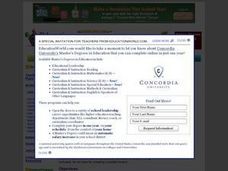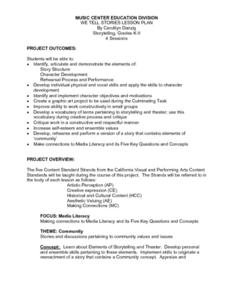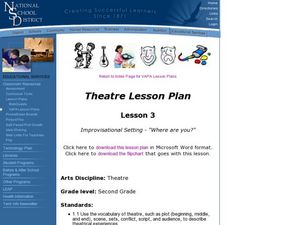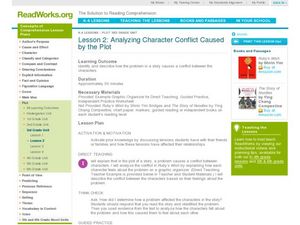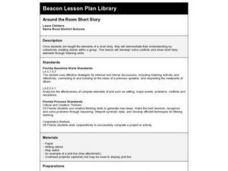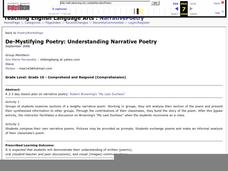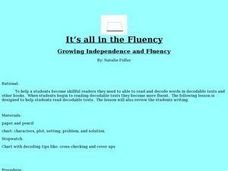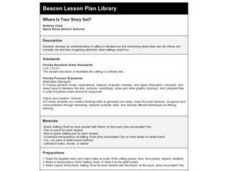Curated OER
Fortune Cookies Motivate Writing
Fortune cookies are used as motivation for a story. In this creative writing lesson, young writers review the six traits process. They discuss interesting characters, setting, problem and solution in a story. Original stories based on...
Curated OER
The News Behind the Story
What a fun way to analyze plot, setting, and character. Learners review story elements, read a short fictional story, then turn the events of that story into a headlining news paper article. Not only does this lesson engage critical...
Curated OER
Create a Playbill!
Seventh graders explore the various elements found in the advertisement of a dramatic experience. Playbills are created that reflect the plot without revealing the climax of the play. Costumes, set construction, and character description...
Curated OER
Where the Red Ferns
Where the Red Fern Grows provides the text for a study of the literary elements of plot, character, and setting. Discussion questions and vocabulary lists are referenced but not included.
Curated OER
We Tell Stories
Young readers bring characters to life by working in small groups to script and perform stories that contain a community concept. Detailed questions and activities are outlined for the class. Consider having your groups create...
Novelinks
Count of Monte Cristo: Questioning Strategy – Tossed Terms
Do you know the setting of The Count of Monte Cristo? What about the main characters? Explore the elements of Alexandre Dumas' novel with a reading comprehension activity. Kids toss boxes with literary elements written on each side,...
Curated OER
Awesome Allegories
Studenets are told that Peter Paul Rubens was born on June 28, 1577, in Siegen, Germany. They create their own allegorical painting, think of a favorite story. Students write a summary of one scene in that story, using Crayola Erasable...
Curated OER
Improvisational Setting - "Where are You?"
Second graders explore setting through improvisations. For this theatre lesson, 2nd graders perform a variety of improvisations in different settings and chart how they established the setting in the different environments.
Curated OER
Analyzing Character Conflict Caused by the Plot
How do we know how a character was affected by the conflicts they encounter in a story? We use evidence from the text to make assertions about the characters we read about. Third graders practice finding and using evidence in a...
Curated OER
Set the Scene
Third graders read the story "A Bargain for Frances" and make predictions about the unfolding plot of the story. In this set the scene lesson, 3rd graders examine the three parts of a story; the beginning, middle, and end.
Curated OER
Learning to Analyze Characters
Students discover writing strategies authors use to enhance characters. In this character writing lesson, students are read the Knuffle Bunny books by Mo Willems and analyze the story, characters and settings as they listen....
Curated OER
Around the Room Short Story
Collective story writing is a great way to reinforce the concept of story elements and collaborative learning. Young writers discuss story elements such as, setting, character, action, climax, conclusion, foreshadowing, dialogue, and...
Curated OER
Introduction to Drama
Introduce your class to drama! You cast each pupil as a different character from a story you have read. They are given a general outline of the scene, act out the scene multiple times, then discuss the weak and strong aspects of each...
Curated OER
Puss in Boots/Jamil and the Clever Cat
Second graders read the story PUSS IN BOOTS identifying main characters, setting, and significant events. They then read the story JAMIL AND THE CLEVER CAT and compare it with the story PUSS IN BOOTS compiling a list of characters,...
Curated OER
Novel Jeopardy
Play a classroom version of the classic game show Jeopardy, to review and discuss the novel your class has been reading. Questions about plot and other story elements are written on cards and given point values. Divide the class into...
Curated OER
De-Mystifying Poetry: Understanding Narrative Poetry
Tenth graders explore narrative poetry. They analyze sections of a poem and present to groups. They compose their own narrative poems using pictures as prompts. They exchange their poems and analyze their classmate's poem.
Curated OER
Story Mapping
Fill-out a story map to help your scholars with pre-writing. They will use a story map template to pre-write. They also organize their ideas into steps which become the foundation for their first draft. Concrete objects are brought in to...
Museum of Disability
Ian’s Walk and Apples for Cheyenne
Help young learners understand friendship and empathy with two reading comprehension lessons. Each lesson focuses on a story about a child with autism, and encourages readers to compare and contrast the characters to each other and to...
Curated OER
It's All in the Fluency
Take a trip to the library! Elementary schoolers visit the library and choose books to read independently. They use the cover-up method of deciphering unknown words and use timed-readings to increase fluency. They discuss characters,...
Curated OER
Comparing Themes and Plots: "Young Goodman Brown" and "The Minister's Black Veil"
Students read two stories by Nathaniel Hawthorne and write an essay comparing plots and themes. In this Nathaniel Hawthorne short stories lesson, students read "Young Goodman Brown" and "The Minister's Black Veil." After a class...
Curated OER
Story Creation Magic: Character, Setting, Plot
Students review the terms plot, setting, and characters and examine how all of these elements are needed to make a story. They are given parts of stories and they try to identify all of those parts of the story.
Curated OER
Character's Qualities
Sixth graders analyze the a character's qualities and the effects of these qualities on the plot and the resolution of the conflict in the story "The Pigman and Me." They develop a list of the qualities, discuss if these qualities were...
Curated OER
Character and Plot Development Through Comics
Third graders are introduced to character, plot development, point of view, and tone through the use of comic strips. They, in pairs, identify these four attributes in the comic strip and present their findings to the class.
Curated OER
Where Is Your Story Set?
Students explore the concept of setting in literature by identifying their own current setting, and imagining what their ideal setting would be. They read a piece of literature, identify the setting and record the information on a chart.
